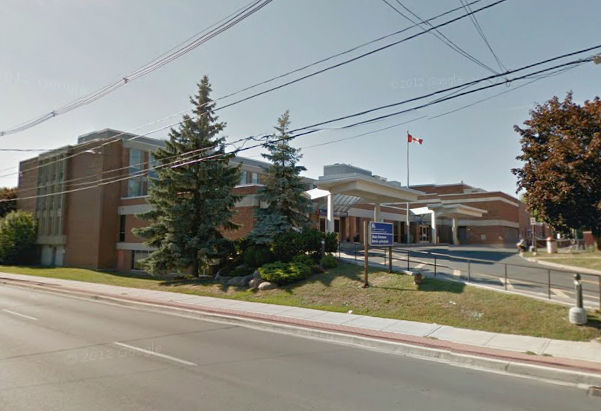
CFN – As many in the community already know, the Cornwall General Hospital is to be sold as a part of what is allegedly the final step in the Cornwall Community Hospital’s ambitious redevelopment plan which would see the Second street site’s services transferred to the Hospital’s McConnell location.
Some in the community have rightly voiced concern at the sale of the public health facility due to various effects it could potentially have on the delivery of service to those in need such as the elderly, I would like to propose an alternative means of looking at this situation.
While we need to address the potential effects there may be on the state of health care delivery in Cornwall because of the proposed amalgamation of services, the sale of the site of the Cornwall General Hospital does not necessarily have to be a bad thing, depending on what replaces it. It is my opinion that if such a transaction is going to take place, the community should strive to make it as positive as possible.
We do so by trying to attract the right investor; one who would have the bold ambition of finally bringing something to Cornwall which it desperately needs, a University. There are both economic and social benefits to living in a community which is the host of a post-secondary institution such as a University.
The following are a few of the benefits associated with having a University in Cornwall:
Youth Retention
As it stands right now, if a Cornwall youth wants to obtain a post-secondary education, the only local option they have is the Cornwall campus of the St. Lawrence College. While the college does indeed provide educational opportunities, they are limited. The current reality is if a Cornwall youth wants a career which would require them to obtain a more specialized University education, they are forced to move away in order to attend a University. A lot of these students do not come back, but instead settle in the cities they have moved away to due in part because there are more employment opportunities.
Moving away to the appropriate post-secondary institutions for their desired education is also more financially straining on the student and their family because of the differences in cost of living, housing, food, transportation, and etc.
If there was a University in Cornwall, youth would be able to stay in the city and spend less on account of the ability to stay with their parents instead of paying for housing. They would benefit from Cornwall’s low cost of living and of course tuition would most likely be competitively low compared to similar institutions in Ontario (as is the norm for smaller-scale Universities) in order to attract students.
Studentification
The phenomenon known as studentification can be defined as the process in which a growing student population migrates in a significant enough number to non-traditional communities and neighbourhoods, and its impact on those community.
Studentification has the potential of positively impacting the local real estate market as students from out of town would require housing. Single-family homes could be converted into income properties by eager Cornwallites who would like to profit from the increase in population. Local businesses which are frequented by students such as bars, restaurants, coffee shops, and etc would also potentially see an increase in sales as their number of customers who would purchase their goods or services would go up due to the population growth associated with studentification.
The regional economy is not the only one who would benefit, attracting students to the community also brings diversity, new ideas, and potentially more community leaders as youth in Canada hold some of the most progressive views in the country.
New Jobs
Establishing a University in Cornwall would ultimately mean new jobs for Cornwall. The institution would have to hire people to fill positions such as faculty staff, administration, student services, professors , teacher’s assistants, tech support, communications, food services, human resources, security, executive, and etc.
Outside of the University, new jobs could also be created in association with a perceived population growth, meaning more goods and services will be needed to be distributed in Cornwall as resources are allocated to a larger population.
Local Businesses would also potentially benefit from joint research partnerships between the University and private enterprise.
Attracting New Community leaders
Cornwall has some great community leaders from a variety of different socio-economic backgrounds. These are men and women from different walks of life who have come together and have taken an active interest in the well-being of our city and I wouldn’t want that to change, but rather I’d want that to be strengthened.
We should try to attract more community leaders, and with a University comes a new intellectual class of residents who are highly educated in specialized fields. These new residents are able to make positive contributions to the community through their involvement in local and regional politics.
On average Professors, Scholars, Students, Alumni are more secular and progressive when it comes time to their economic and social views. Imagine a more engaged and informed electorate, more diverse in opinion and potentially a bit less hostile to change. Cornwall could potentially reap that reward because there is a positive correlation between higher education and voting behaviour, as well as civic engagement.
In conclusion, while the sale of the Cornwall General Hospital may be viewed with a bit of hostility, it does not mean that it cannot be a positive opportunity for the city and the well-being of the local economy. If we could attract the right investor, one who would be willing to build a University here, we would potentially reap a number of economic and social benefits associated with having that post-secondary institution in the area through perceived youth retention, studentification, the creation of new jobs, and the potential attraction of new community leaders to the area.
 Born and raised in Cornwall, Ontario, Stéphane is a principled moderate as well as a student at the University of Ottawa. He is avidly passionate about politics, policy-making, as well as getting youth involved in the democratic process.
Born and raised in Cornwall, Ontario, Stéphane is a principled moderate as well as a student at the University of Ottawa. He is avidly passionate about politics, policy-making, as well as getting youth involved in the democratic process.
.
Stéphane also loves to observe and explore his surroundings, take part in rational discussion, learn new things, write, and meet new people.
.
If you wish to contact or sponsor Mr. Groulx email us at info@cornwallfreenews.com or call our hotline at 613 361 1755


Well expressed Stéphane, your argument was well constructive and reasoned. It shows a progressive attitude towards the foreclosure and looks at is as an opportunity for community renewal and urban expansion which is necessary for Cornwall’s development if it wants to survive as a flourishing community. The college is a wonderful, but it is limited and most of the people who graduate (particularly the nursing program) will move away and cannot contribute to the town’s growth.
If there is only one thing I disagree its the location, I find it slightly limiting for a fully developed University. If plans were made there would have to be serious consideration in expansion and development, what programs would begin initially, hiring tenor profs and the like. Then there should be retention for students and opportunity for them to stay and contribute, with that has to come with businesses and infrastructure which will provide services to professions.
What people need to understand is that Cornwall is not a mill town any more. There is still a narrow minded mentality that robs this town of inventive spirits who need to move away to find a more progressive environment that would allow them to flourish. I feel badly that the hospital is being foreclosed, but let’s face facts its foreclosure had been planned for years, the outrage seems to come from people that just want to explode about any issue. In addition the General has never been a hospital where services are first rate, the wait time is excruciating and I’ve always found it to be a very negative environment for rehabilitation.
Cornwall needs expansion, a population sustained only by Baby boomers will only be a bust. With education comes greater opportunity for enlightenment and progressive thinkers. Lets abandon the past and look to the future, that’s where hope is found.
Are hiring for more government ( taxpayer funded) jobs just removing money from other core services, assuming a constant tax level now?
Where will the students come from? On-line courses from already recognized universities have become main stream and need to factor in. We see the Ottawa hospital expansion to service Quebec residents, will Cornwall go that route for students? (The only issue I have with providing Quebec residents with services in Ontario besides paying a lower fee, is that we pay for the expansion, staffing and an additional annual health tax, just to have higher costs and longer wait times)
I do like the idea of having higher education in Cornwall, just how to pay & get there needs to be reasoned.
Good point, Eric. Governments are curtailing expenditures in response to the worldwide economic downturn. I know several people who are living in Cornwall and obtaining a university level education without having to leave town . . . . Athabasca University and several other universities are offering distance learning, online learning and correspondence learning programs.
One time management guru and professor of management studies, Peter Drucker authored several highly regarded books on management . . . several years ago, he foresaw major changes in higher education, especially university programs. With further advances in telecommunications technology, future access to distance learning will improve.
The site of the Cornwall General Hospital lacks parking, making it unsuitable as a site for use as an educational institute. It may be converted for several applications:
– A private clinic
– A private educational institute
– A seniors’ residence
– Professional offices
– Apartment complex
– A hotel
– Combination of the above applications
Very well written Stéphane.
There are a few issues regarding a university I think should be considered. Post secondary education has been the ruin of our general education system in Canada for years.
They alone dictate what and how curriculum will be administered in schools. Most may believe it is government but I can assure you it is not.
We are stuck in a paradigm created by post secondary education and the old industrial revolution mentality.
Let me ask a couple of questions.
How can a school system prepare students for the future of economic growth and manufacturing change following graduation, which is about 4 years after registration and enrollment, yet nobody can anticipate what the economy will be like on Monday?
How do we expect to teach a cultural identity, when the world is leaning to globalization? Two prime examples are the current situation with the aboriginals and people of Quebec. We can also consider the nonuse of the term Merry Christmas and removing the religious aspect of many other holidays.
The need for secondary education is old and out of date. Yes you have a better chance of getting a job but there is no guarantee as was until the late 1980’s.
We don’t really need a university but an education system that actually lets our kids improve on abilities they already have.
I have recently looked into becoming a teacher, I have been encouraged for some time to try and teach preliminary aspect of engineering, design tech, electronics and processes. I visited the local teachers college and was assured entry based on experience and they assured me the need was there. Before I enrolled I carried out a little research as to what schools are teaching and if there would be a need. Well I am glad I did the research, high schools from London through to Eastern Ontario only offer courses such as, welding, auto mechanics, hospitality (which falls under shop class now) but none were offering any courses to potential prepare for electrical, controls, nor true manufacturing skills.
That is alone the choice of the principals in each high school…..
The money is available and the government issues a curriculum, its sad that the schools only use the cheapest classes to operate
This issue is merely another example of llocal politicians whether municipal or provincial who lack total empathy for the people they are SUPPOSE TO REPRESENT.
Municipal members were all full of excuses,provincial member had a family gathering …in other words …doesn’t care .. and will go as far as Tim Hudak … nowhere … and we will end up with another Liberal government …. and go no where.
The sale of the 2nd street site is a done deal …get over it.The cost of revamping this site is not affordable by our local council so it WILL NOT HAPPEN .I very much doubt if they will pay the amount requested by the hospital recently to help pay for the MRI . !
Yes I fully agree that we do need long term health care facilities locally but this is NOT the answer.
Mind you ..I do not have the magic solution either but grasping at straws and with no money …does not solve the problem .
In my opinion we should follow Brockville’s example of years ago and go for NEW AND YOUNG PEOPLE TO LEAD US FORWARD.
The ideal solution would be a bi-law to allow ONLY those under 40 years of age to run for a seat on council. Then we would have NEW IDEAS like Brockville did ..
Did any one notice that Brockvilles population increased 4 times in the last 20 years and ours DIMINISHED. !!!!
Think about it ….Brockville’s YOUNG mayor moved on to provincial politics .. We elected a mayor who lost out of federal politics because the people of the riding figured out that he was not representing us as he should ..but he was GOOD ENOUGH for Cornwall. !!!!Reflect on what has happenned in the past year with the city officials.
So…. to sum it up …until we elect people that truly care about us and OUR NEEDS not theirs …then we can move forward … and not accept just excuses from our local politicians .
First a response to Patrick Glover’s curious assessment ‘the General has never been a hospital where services are first rate’.
I’ve have had knee surgery performed at the General, interior stitches placed in an elbow and some stitching of my scalp. All 3 treatments were handled quite well. Are you suggesting that the Cornwall Community Hospital has always provided top-notch services?
Stephane you provide a sound analysis of how a University town would develop. But just because you provide the building doesn’t mean the people will come.
This is not an an academic town. Roughly one-quarter of high school students drop out each year with a correlative to teenage girls pushing babies in carriages along city side walks on mothers allowance.
How can a small population with a serious high school drop out rate simultaneously carry a University?
I attended the University of Ottawa off-campus at our local college back in the late 70s. I was able to obtain my first year there towards a BA. The remaining courses had to be taken at main campus in Ottawa.
I took an upgrading course for my BA five years ago, again at the Cornwall off-campus for Ottawa U. There were no more in-class professors and the course was being vicariously displayed via satellite from an on-campus class.
So if the Ottawa U off-campus provision has deteriorated, how would a full fledged University thrive here.